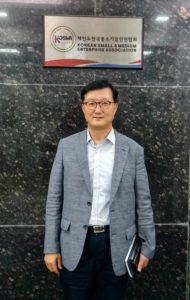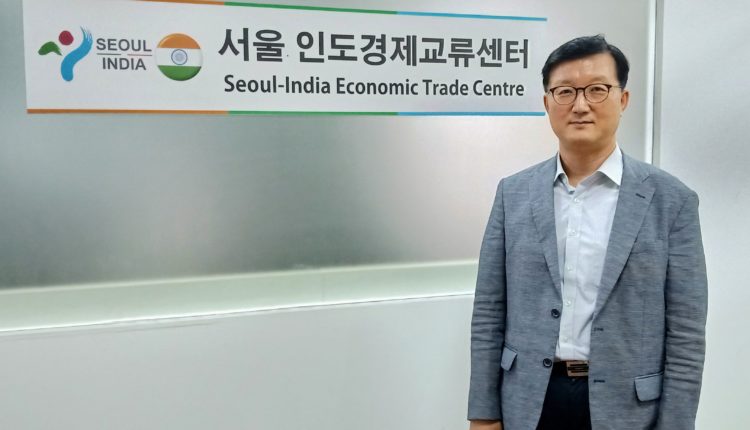Korean SMEs seek sops, easy access to Indian markets
Besides adding more items in the foreign trade agreement ‘Comprehensive Economic Partnership Agreement (CEPA),’ Government of India ponder on welcoming more Korean investments and announce practicable incentives for the Korean SMEs
Gurgaon. With ambitious plans to bring mammoth Korean investment in the Small and Medium Enterprises (SMEs) sector in India, the Korean Small & Medium Enterprises Association in India (KOSMA) has urged the Narendra Modi government to effect the necessary changes in the foreign economic policy thereby ensuring smooth and trouble-free entry of a large number of Korean SMEs into India.
Besides adding more items in the foreign trade agreement ‘Comprehensive Economic Partnership Agreement (CEPA),’ Government of India ponder on welcoming more Korean investments and announce practicable incentives for the Korean SMEs such as 5-years tax holiday, reduced customs duties and other levies, reduced land acquisition cost and also ensure ease of doing business and enjoy the benefits of the business.
Formed last year especially to facilitate entry of SMEs into India –KOSMA is working very hard to bridge the gap between Korea and India in this sector. Primarily to focus on teething issues faced by SMEs, KOSMA is aiming to have a recognition onboard of Indian government policies & directives.
 Y. K. Lee, Chairman of Korean Small & Medium Enterprises Association in India (KOSMA), estimates that the Indian government shifts its focus from agriculture-based economy to manufacturing and thus strengthen its “Make in India” initiative, and should not hesitate to source technology from Korea, which is as much recognised in the world as other countries such as Japan, Germany & USA.
Y. K. Lee, Chairman of Korean Small & Medium Enterprises Association in India (KOSMA), estimates that the Indian government shifts its focus from agriculture-based economy to manufacturing and thus strengthen its “Make in India” initiative, and should not hesitate to source technology from Korea, which is as much recognised in the world as other countries such as Japan, Germany & USA.
However, unlike large multinational companies, it is not easy for the Korean SMEs to enter India for she being an uncharted territory for many Koreans, Lee said adding that the government may go on to create an ecosystem for the Korean SMEs for their easy and favourable entry into India.
Lee is the Former India Director Hyundai where he worked for 29 years and was in India between 2007-2011 and 2014-2016. After quitting Hyundai in 2016, Lee founded KO-IN Business Development Center (KIBC) and Seoul-India Economic Trade Centre (SIETC) to help Korean Companies build strategic partnerships with their Indian counterparts. This initiative has been bearing fruit as many Indian Companies have now been able to grow their businesses and in some cases diversify their portfolio as well. Managing both ventures from Gurgaon, Lee is constantly looking at the changing dynamics of Indian economy as whole and manufacturing sector in particular.
“Korea is world’s top manufacturing hub with almost 40% of its GDP coming from the manufacturing sector, which is more than two times than that of India as it generates 15-17% of its GDP from the manufacturing sector. With the abundance of manpower, India can become the manufacturing hub of the world. Initiatives such as ‘Make in India’ are definitely going to help the nation’s growth,’’ said Lee in an interview with Asian Community News (ACN) Network.

“Accelerated growth in Indian economy will result into better livelihood of Indian people. Agriculture is beyond doubt an important sector of Indian economy, though it’s the industrialization that will ensure notable growth in GDP of India,” suggested the KOSMA Chairman.
“Government of India should promote sourcing of technology from friendly places and build R&D hubs across the nation. This will generate investments. I also admire the Government’s decision to incentivize R&D in Companies. It is like sowing seeds for 5-10 years.” said Lee. He hopes that the policy makers focus on Korean story for industrialization as Koreans are honest, diligent, hard-working and open-minded people.
Lee felt immensely proud to say that Korea progressed exponentially and grew to the world economic scene after the Korean war 1950-1953, and it’s a great example to follow for the world.
In terms of the talent pool, Korea has one of the best manpower in the world.
Lee hopes that India becomes self-sufficient in 8-10 years. He further said, “India can benefit largely from Korea which is very strong in semiconductors, electronics, defense, automotive, hi-speed trains, shipbuilding, chemicals, steel, hi-tech material, agriculture, smart farms and food-processing.”
“Till now, India had only 500 Korean companies among which included large companies like Hyundai, LG, Samsung, and their joint ventures, vendors and OEM suppliers. And independent SME companies which are about 250 in numbers. Ironically, China has 40,000 Korean companies and Vietnam has 7000 companies. If the government relaxes the entry doors for Koreans, more than 2000-3000 companies may easily come to India in the next few years.”
However, the decision of coming to India by the Korean SMEs is not easy as quite less information is available on the business threats and opportunities as well as ROI, ease of doing business, Indian economic policies in SME sector; therefore the role of KOSMA becomes very crucial here in facilitating the Korean SMEs in India, even though KOTRA is providing some information to them.
That’s why KOSMA which was formed last year in 2018, with support of the Embassy of Republic of Korea in India and KOTRA, is organizing a Special workshop on “How to come and survive in India?”, also how to contribute to the Indian economy and build economic friendship in August. KOSMA may also sign an MOU with FISME on this occasion.


